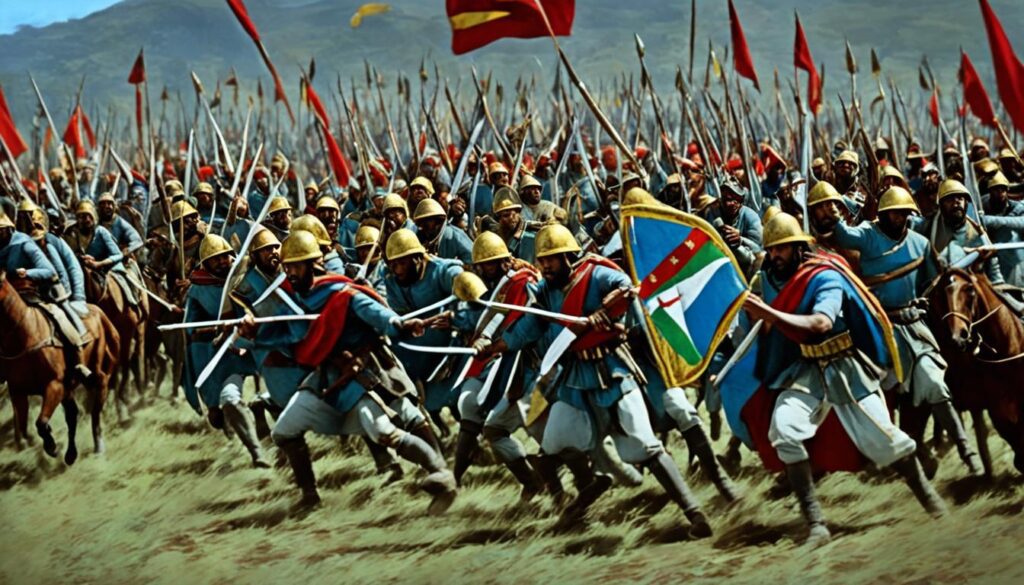How Did Ethiopia Defeat Italy?
Did you know that Ethiopia achieved a remarkable victory against Italy, defying the odds and securing its independence? The Battle of Adwa, fought in 1896, remains one of the most significant milestones in the struggle against European colonization in Africa. It not only changed the course of Ethiopian history but also inspired other African nations in their resistance against European powers.
Key Takeaways:
- The Battle of Adwa, fought in 1896, was a major victory for Ethiopia against Italian colonization.
- Led by Emperor Menelik II, the Ethiopian forces successfully repelled the Italian invasion and secured their independence.
- The Battle of Adwa shattered European beliefs in African inferiority and inspired other African nations in their fight against colonization.
- The victory at Adwa had a profound impact on the concept of Pan-Africanism and the unity of African nations.
- It remains a symbol of African resistance against European domination and the power of unity and determination.
The Background of Italian Colonization in Ethiopia
In the late 19th century, Italy, along with other European powers, embarked on a quest to establish colonies in Africa during what is known as the Scramble for Africa. Italy’s aspirations for colonization extended to the Horn of Africa, where they occupied territories such as Eritrea and parts of Somalia. These initial territorial acquisitions set the stage for Italy’s ambitions to expand further into Ethiopia.
Italian-Ethiopian relations during this period were characterized by a complex dynamic of diplomacy, negotiations, and tensions. Emperor Menelik II of Ethiopia entered into a treaty with Italy, which recognized Italy’s claim to Eritrea in exchange for arms and financial support. However, disagreements arose surrounding the extent of Italian control over Ethiopia.
This backdrop of Italian colonization in Ethiopia set the stage for the momentous Battle of Adwa.
“The occupation of Ethiopia can be justified by the need for strategic spheres of influence in Africa.” – Italian justifications for colonization.
Emperor Menelik II’s Preparation and Mobilization for Battle
Emperor Menelik II, together with his wife Taytu Betul, played a crucial role in preparing Ethiopia for the defense against the Italian invasion. Menelik mobilized a large and diverse army from different regions and ethnic groups of Ethiopia, ranging from 80,000 to 120,000 troops. He strategically downplayed the size of his forces to mislead the Italians. Menelik’s leadership and ability to unite Ethiopia’s provincial rulers behind him proved instrumental in the success of the Ethiopian defense against Italy.
Organizing a Multifaceted Army
Menelik II demonstrated exceptional skill in mobilizing an army that represented the rich diversity of Ethiopia. In a testament to his leadership, he gathered forces from various regions and ethnic groups, including the Amhara, Oromo, and Tigray. This approach not only bolstered the Ethiopian defense but also fostered a sense of unity among different communities in the face of a common threat.
Tactical Deception
To gain an advantage over the Italians, Menelik II implemented tactical deception by understating the actual size of his forces. By manipulating their perception, he successfully misled the Italian commanders into underestimating the strength of the Ethiopian army. This strategy allowed Menelik to surprise the Italians with a much larger and more capable force than they anticipated, giving his troops a significant edge in the Battle of Adwa.
Leadership and Unity
Menelik II’s leadership played a pivotal role in uniting Ethiopia’s provincial rulers under a common cause. His ability to inspire loyalty and forge alliances with influential regional leaders ensured a coordinated effort in the defense against Italy. Together with his wife, Taytu Betul, who provided crucial support and advice, Menelik’s leadership became the foundation of Ethiopia’s resistance against colonization.
In the Battle of Adwa, Menelik II’s strategic preparation, mobilization of Ethiopian forces, and unifying leadership were vital factors that contributed to the eventual Ethiopian victory over the Italians.
| Key Factors | Description |
|---|---|
| Army Diversity | Menelik mobilized a diverse army, incorporating troops from different regions and ethnic groups of Ethiopia. |
| Tactical Deception | Menelik deliberately understated the size of his forces, misleading the Italians and gaining a strategic advantage. |
| Leadership | Menelik’s ability to inspire unity among Ethiopia’s provincial rulers was instrumental in the success of the Ethiopian defense. |
The Battle of Adwa and Ethiopia’s Victory

On March 1, 1896, the Battle of Adwa took place near the town of Adwa in northern Ethiopia. The Ethiopian forces, well-armed and outnumbering the Italians, quickly overwhelmed the Italian troops. The Italians, disorganized and lacking supplies, suffered heavy casualties and were forced to retreat. The Ethiopians achieved a casualty rate of up to 70 percent among the Italian forces. The victory at Adwa not only secured Ethiopia’s independence but also shattered European beliefs in African inferiority and inspired further resistance against colonization.
The Battle of Adwa was a turning point in the history of African resistance against European colonization. It showcased the determination, military prowess, and unification of Ethiopia against the Italian invasion. The Italian retreat and heavy casualties suffered in the battle demonstrated the strength of African nations in the face of colonial aggression. This victory proved that Africans were not inferior, challenging racist European ideologies of the time.
“We have shown that we can fight as well as any white nation!”
The Battle of Adwa holds significant historical and cultural importance. It inspired other African nations to rise up against colonization, sparked pan-African solidarity, and became a symbol of African independence. The triumph at Adwa rallied African nations and leaders, encouraging them to challenge European domination and fight for their freedom.
The Impact of Adwa on African Resistance Movements

The victory at the Battle of Adwa had a profound impact on African history, challenging European perceptions of African inferiority and igniting a spirit of resistance against colonization. The battle served as a rallying cry for African nations, inspiring them to assert their independence and fight against colonial powers.
“The Battle of Adwa is not just about Ethiopia, it is a triumph for Africa and a symbol of African resistance against European domination.” – Emperor Haile Selassie
The significance of Adwa extended beyond Ethiopia’s borders, energizing the pan-African movement. Leaders and intellectuals across the continent recognized the power of unity and solidarity in the face of colonial oppression, giving rise to the concept of Pan-Africanism.
The Rise of Pan-Africanism
Pan-Africanism emerged as a political ideology and movement, advocating for the liberation and unification of African nations. The victory at Adwa became a powerful symbol for Pan-Africanists, demonstrating the potential for African nations to resist and overcome colonization.
The principles of Pan-Africanism emphasized the common struggles faced by African nations and the importance of collective action in achieving independence and self-governance.
- Prominent Pan-Africanists like Marcus Garvey and W.E.B. Du Bois cited the Battle of Adwa as an inspiration in their calls for African unity.
- The Pan-African Congress, founded in 1900, aimed to foster collaboration and solidarity among African nations in their pursuit of liberation.
- Adwa served as a catalyst for future independence movements across Africa, fueling the determination to free the continent from colonial rule.
A Legacy of Resistance
The Battle of Adwa remains a pivotal moment in African history, symbolizing the resilience and determination of African peoples in the face of European colonization.
This triumph over a European power shattered prevailing notions of African inferiority and brought international attention to the African struggle for independence.
It paved the way for subsequent independence movements across the continent, inspiring generations of African leaders and activists to continue the fight for self-determination.
The image above exemplifies the unwavering spirit of African resistance against colonization, highlighting the enduring legacy of the Battle of Adwa and its impact on the path towards independence.
Conclusion
The Battle of Adwa stands as a remarkable testament to the enduring spirit of African resilience and the indomitable pursuit of freedom. This historic victory not only secured Ethiopia’s independence but also left a lasting impact on the entire African continent. The battle shattered European perceptions of African inferiority and ignited a flame of resistance that burned bright in the hearts of oppressed nations.
Adwa became a rallying cry, a symbol of hope and determination for African peoples facing the wrath of European colonization. The significance of this triumph reverberated throughout the continent, inspiring others to stand up against their oppressors and fight for their right to self-determination.
Furthermore, the Battle of Adwa played a crucial role in shaping the concept of Pan-Africanism. The unity displayed by Emperor Menelik II and the Ethiopian people sent a powerful message to the world, emphasizing the importance of solidarity in the face of adversity. Adwa became an emblem of African pride, a landmark event that fostered a sense of shared identity and purpose among African nations.
The legacy of the Battle of Adwa continues to shine as a symbol of African victories against colonization. It remains a poignant reminder of the power of unity, strength, and unwavering determination. The resilience and bravery displayed on that fateful day have left an indelible mark on African history, serving as an enduring inspiration for generations to come.




